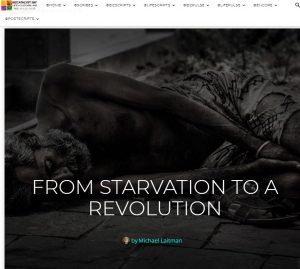
Even before the outburst of Covid-19, millions of people were already on the brink of starvation. Food stamps are no solution, and neither is subsidized housing. The coronavirus has made things far worse, and from day to day, the situation is growing more and more precarious. Society is on the edge, and no administration will be able to restore order to the streets if all hell breaks loose.
There is also no point looking for a scapegoat; if we really want to blame anyone, we should look in the mirror. We, and our parents, have ruined the world for ourselves and for our children. Look at us: Half the world is overweight, the other half is starving. It is an accurate reflection of our egoism, alienation, and reckless sense of entitlement.
This egoism, this baseless sense of entitlement, is the root of all our troubles. Worse yet, egoism hides from us the fact that it is our biggest, and in fact our only problem. It tricks us into thinking that other people are the cause of our misfortunes, and selfishly, we fall for the convenient lie. But if we recklessly try to gain more and accumulate more, and judge what we have not by how much we need, but by how much we have more than others, then we will deplete and ruin our planet completely. We are already very close to it, and the outburst of the virus is just a symptom of a collapsing world that’s slipped off balance and can no longer sustain its inhabitants: humankind.
According to Sally Davis, former chief medical officer for England, “there will be a next [pandemic]. Covid-19 is neither the first nor the last health emergency we will face. My fellow scientists estimate that we will face a pandemic or health emergency at least once every five years from here on. There is a chance that this is the optimistic scenario. The reality could be far worse.” This is why we have to change course now before it’s too late.
Since egoism is the root of our problems, we must tackle it and rein it in if we are to leave anything for the next generation. We have to understand that we are dependent on each other. If one person is sick, everyone is sick. If one person behaves irresponsibly, everyone suffers. The only “right” we really have is to behave responsibly, to be considerate toward each other so we can continue to live on a bearable level, first, and from there begin to improve it.
But since we’re egoists, and egoists are considerate only toward people they care about, we have no choice but to learn how to care for each other. At the very least, we have to start looking for ways to change how we feel about each other—from the current negative to a more neutral feeling and eventually to a positive feeling toward each other. Again, this is not a utopian fantasy; it is an existential stipulation!
We have to revolutionize our entire perception of humanity. We cannot afford to keep thinking of ourselves as a collection of separate individuals; we have to start perceiving ourselves as a single entity that’s caring for all its organs. If we don’t, the individuals we see around us will soon start occupying themselves with killing all the other individuals around them.
We shouldn’t think that we are too weak or small to make a difference. Each of us can make a difference in our closest circles, and the accumulated impact will be strong enough to pull the wagon out of the mud and start moving in the right direction.
We are at a tipping point. If we start using firearms against each other, we will collapse into a civil war. But if we get a grip on our raging egos and understand that we are dependent on each other (as much as we dislike the thought), then perhaps, if we cherish life, we will want to learn how to care for one another. From that point on, the road will open for us to reverse the trend and start lifting humanity, and our personal lives, to the levels they can achieve.
We can have peace, abundance, health, and security. But we must remember that if not all of us have it, none of us will have it. This is the law of every ecosystem, and it applies just as rigidly to each of us.
Featured in BizCatalyst, Facebook, LinkedIn